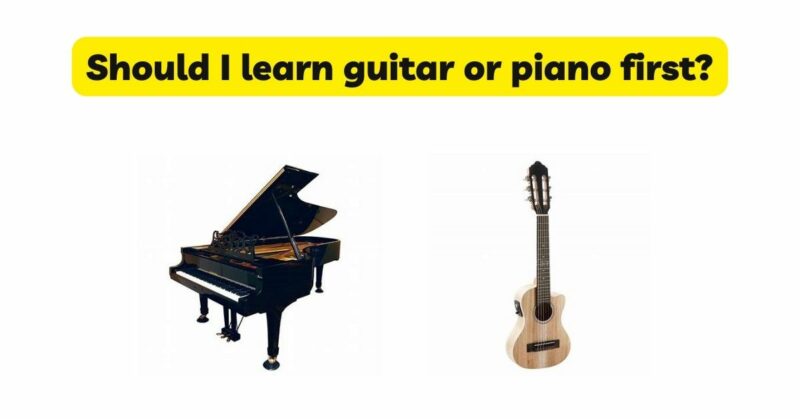Entering the world of music is an exciting and fulfilling endeavor, but one of the early decisions aspiring musicians face is whether to learn the guitar or piano first. Both instruments have their own unique charm and offer a plethora of musical possibilities. In this article, we will explore the considerations, benefits, and factors involved in choosing between learning the guitar or piano as your first instrument. By understanding the musical characteristics, personal preferences, and long-term goals, individuals can make an informed decision and embark on a rewarding musical journey.
- Personal Musical Preference: The first factor to consider when deciding between the guitar or piano is your personal musical preference. Reflect on the genres and styles of music that inspire you the most. The guitar is often associated with popular music genres like rock, blues, and folk, while the piano lends itself to classical, jazz, and contemporary music. Choose the instrument that resonates with your musical taste and allows you to explore the genres you are most passionate about.
- Learning Curve and Initial Progress: Consider the learning curve and initial progress associated with each instrument. The guitar is generally regarded as more accessible for beginners, as it requires learning basic chords and strumming patterns to start playing recognizable songs. This immediate satisfaction can provide motivation and a sense of accomplishment. On the other hand, the piano requires learning music notation, hand coordination, and finger independence, which may take more time before playing recognizable melodies. Assess your patience and willingness to invest time in the initial stages of learning each instrument.
- Musical Foundation and Theory: Learning the piano as a first instrument provides a solid foundation in music theory. The piano’s layout and visual representation of musical concepts make it easier to grasp scales, chords, harmonies, and music notation. Understanding these fundamental elements opens the door to playing other instruments and facilitates the comprehension of music theory as a whole. If a strong foundation in theory and notation is important to you, starting with the piano can provide a solid basis for future musical endeavors.
- Technical Considerations: Take into account the technical considerations of each instrument. The guitar requires finger dexterity, fretting, strumming, and picking techniques. It may be more challenging for individuals with smaller hands or less finger strength. The piano, on the other hand, demands hand coordination, finger independence, and an understanding of playing dynamics. Consider your physical attributes and which instrument feels more comfortable and natural for you to play.
- Versatility and Musical Expression: Both the guitar and piano offer unique opportunities for musical expression, but their versatility differs. The guitar is often associated with accompanying oneself, playing melodies, and exploring various playing styles. It allows for chord-based playing, fingerpicking, and soloing. The piano, with its polyphonic capabilities, lends itself well to harmonies, complex arrangements, and a wide range of musical genres. Consider the level of versatility each instrument offers and which aligns better with your musical aspirations and desire for creative expression.
- Long-Term Goals and Musical Aspirations: When deciding between the guitar or piano as your first instrument, it is important to consider your long-term musical goals and aspirations. Reflect on the genres, styles, and specific musical achievements you hope to accomplish. If your goal is to compose intricate arrangements, explore classical music, or delve into jazz improvisation, the piano may be a more suitable starting point. If you aspire to perform in a band, write songs with the guitar as your main instrument, or explore contemporary music genres, the guitar may be the better choice.
- Accessibility and Resources: Consider the accessibility of each instrument and the availability of resources for learning. The guitar is portable and can be played in various settings, making it easier to practice and learn in different environments. It is also accompanied by a wealth of online resources, tutorials, and communities dedicated to guitar education. The piano, although less portable, is often accessible in public spaces, schools, and music institutions. Piano teachers and instructional materials may be more readily available in some areas. Consider which instrument is more accessible to you and what resources are accessible for learning purposes.
- Follow Your Passion: Ultimately, the decision between learning the guitar or piano first should be guided by your passion for music. Choose the instrument that ignites your enthusiasm and keeps you motivated to practice and improve. Remember that learning an instrument is a journey, and your passion for the instrument will be the driving force behind your progress and musical development. Select the instrument that resonates with you, sparks your creativity, and brings you joy when playing.
Conclusion: In conclusion, choosing between learning the guitar or piano as your first instrument is a personal decision that should be guided by your musical preferences, long-term goals, technical considerations, and the availability of resources. Consider your musical taste, the learning curve, the foundation in music theory, technical requirements, versatility, and long-term aspirations associated with each instrument. Ultimately, choose the instrument that excites you the most and allows you to express yourself in the genres and styles that resonate with your musical passion. Remember, regardless of which instrument you choose, the journey of learning and playing music is a rewarding one that can provide a lifetime of joy and creative fulfillment.


